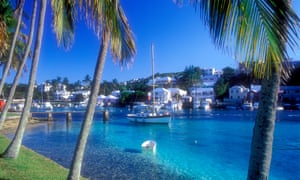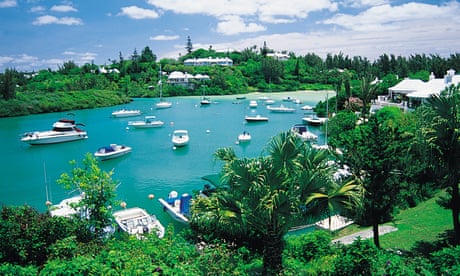the guardian
Islands’ deputy premier hits back against British MPs’ attempt to force offshore companies to name their owners
 |
| Bermuda has been criticised by Oxfam as the world’s worst corporate tax haven. Photograph: Alamy
The government of Bermuda has hit back at British efforts to end offshore financial secrecy, claiming the UK itself is a “tax haven”.
|
Speaking ahead of a meeting on Wednesday between Theresa May and the leaders of Britain’s overseas territories, Bermuda’s deputy premier and finance minister, Bob Richards, pushed back against proposed legislation that would create public registers naming the owners of offshore companies.
Richards said the UK should get its own house in order before making demands from its dependencies.
 |
| Bermuda is world's worst corporate tax haven, says Oxfam |
“The UK is a tax haven,” he said, citing non-dom laws that allow foreign nationals to live in Britain without paying tax on overseas income.
“You have more billionaires resident in London than any place on earth. They are not here for the weather, they are here for the tax climate. We have a double standard going on here.
“We have a much more transparent, much cleaner system than the countries that promulgate these rules in the first place. The popular notion that somehow there is something nefarious going on in a small island that is relatively successful is false.
From April 2017, however, non-doms will lose some of their advantages and foreign nationals will no longer be able to enjoy tax breaks indefinitely in the UK. Those resident in the UK for 15 out of the previous 20 years will be liable for inheritance, capital gains and income tax on their worldwide assets.
A cross-party group of 88 MPs, led by the tax campaigner Margaret Hodge, is backing an amendment to the government’s criminal finances bill that would force British territories to follow the UK in making public their company ownership registers by 2020.
“There is a thing in this world called privacy and at least in my island privacy still exists,” added Richards. “There is no public right to know anybody’s private business.”
The Panama Papers exposed how thousands of offshore companies have been used to help hide the proceeds of fraud, political corruption and tax evasion.
Unlike most tax havens, Bermuda does keep a central government record of who owns its offshore entities. This information is available to other governments on request, but not to the general public.
Richards told the Guardian he would resist calls, first made by David Cameron in 2013, to open up the register. “The register in Bermuda is there to protect the government’s reputation ... It is not the public’s business. We are not here to tell you who is doing business in Bermuda,” he said.
Bermuda has just been named chair of the United Kingdom Overseas Territories Association and is leading the push against Hodge’s proposed amendment. Richards said there was no obligation for Bermuda to lift the veil of secrecy when the US states of Delaware, Wyoming and Nevada continued to keep ownership information from the public.
“We cannot move to a standard that our major trading partner has not adopted,” said Richards. “We may very well lose business. Would you take that chance?”
Bermuda is among the most prosperous of Britain’s 14 offshore territories. Along with London and New York, it is one of the top three centres for the insurance industry globally. But the financial crisis led to an exodus of the best-trained workers and a reduction in financial services income from which Bermuda is only just beginning to recover
While Bermudian companies did not feature heavily in the Panama Papers, they have played a role in other financial scandals including Bernie Madoff’s notorious Ponzi scheme and more recently in fraudulent public offerings on the Singapore stock exchange.
The mid-Atlantic nation is a major centre of tax avoidance, with Google and other multinationals attracted by a zero corporation tax rate. Oxfam found that US corporations reported $80bn (£64bn) in profits in Bermuda in 2012 – more than their combined reported profits in Japan, China, Germany and France.
“People are pressuring overseas territories because they feel we are defenceless, in some way easy pickings,” said Richards. “They are moving the goalposts on us almost every three weeks.”
READ THE FULL REPORT HERE
No comments:
Post a Comment